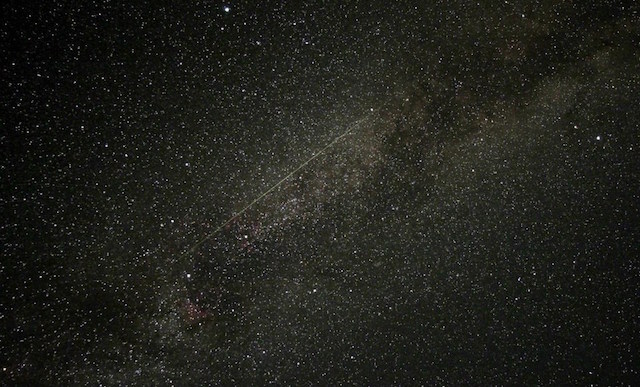Perseid Meteor Shower Peaks Tonight, And This Year Is Supposed To Be Great
By Gwendolyn Purdom in News on Aug 11, 2016 4:40PM

The Perseid Meteor Shower, photo by Victor Rogus via The Adler Planetarium Facebook page
NASA says this year's Perseid meteor shower, which is set to peak Thursday and Friday evening, will be the best and brightest in recent years, and we're inclined to believe them, because, you know, they're NASA.
This year's event is being classified as an "outburst," or a shower with more meteors than usual—as many as double, according to NASA's forecasters. The last Perseid outburst happened in 2009 and the next one might not be until 2027, one astronomer told NPR.
Here in Chicago, aspiring astronomers may not have much luck spotting any shooting stars (technically, they're meteors) through the bright city lights, but there are other options. As Adler Planetarium astronomer Mark Hammergren told Chicagoist before last month's much smaller Delta Aquarids shower, places like the Indiana Dunes, or less populated areas south or west of the city may be smart sky-viewing bets for Chicagoans. Adler is also hosting its annual Perseid Star Party—which will feature telescopes, constellation storytime, and games— in west suburban Wheaton's Cantigny Park Friday night, a location Hammergren described as "about the best we can do" viewing-wise close to the city. NASA says the best time to look for Perseid meteors this year is between midnight and dawn Friday morning. They also recommend giving your eyes up to 45 minutes to adjust to the darkness. Peak activity is expected through Saturday.
Most years, the Perseid shower lights up the sky when Earth travels through the edge of an ancient comet's trail of debris, but this year, because of Jupiter's gravity tugging on those debris trails, NASA says we'll actually be traveling through a denser trail of galactic dust, meaning the shower will be extra meteor-y.
The Adler Perseid Star Party, which sold out last year, starts at 6 p.m. Friday and lasts until midnight. Tickets are $9 for planetarium members and kids online, $12 for non-member adults online; or $15 for adults and $9 for kids at the event.
Happy sky gazing!